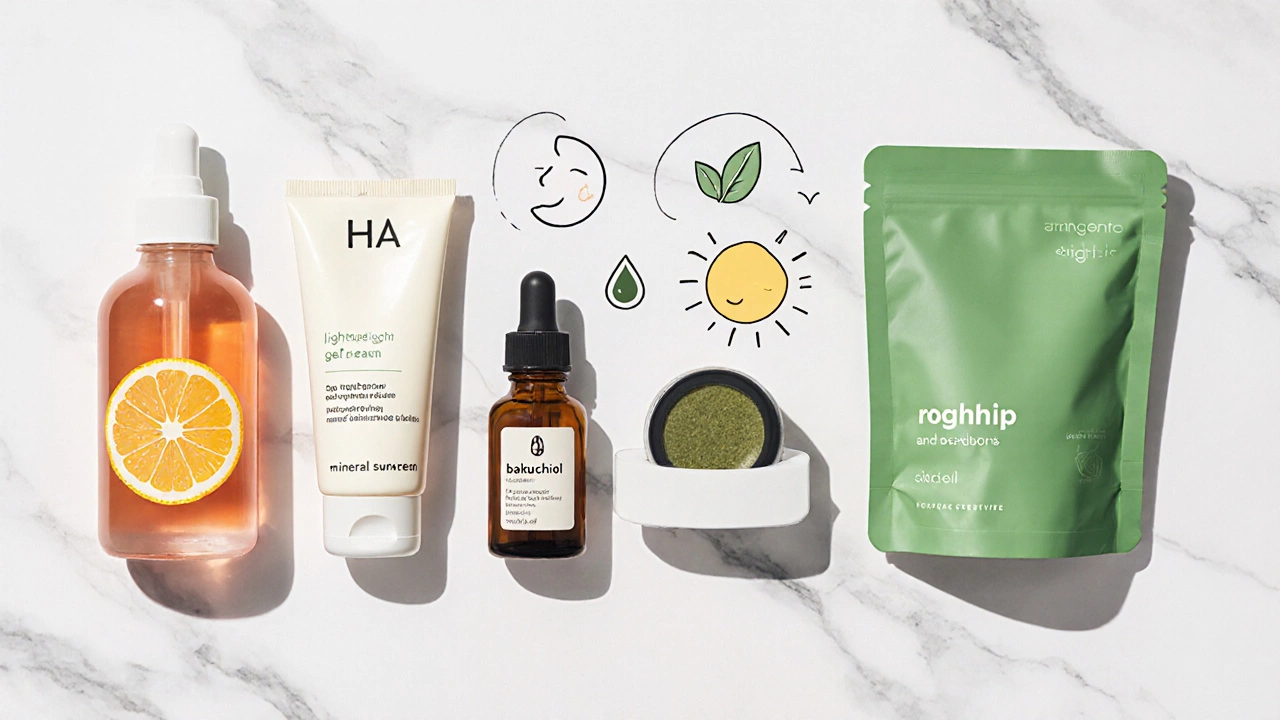
Natural Wrinkle Reducer Routine Builder
Build Your Personalized Natural Anti-Aging Routine
Select your skin type and preferred ingredients to create an effective natural wrinkle reduction routine based on scientific research.
Quick Takeaways
- Vitamin C, bakuchiol, and rosehip oil are the three most studied natural wrinkle reducers.
- Effective concentrations range from 5%-20% for most botanical actives.
- Pair antioxidants with a moisturizer that contains plant‑derived hyaluronic acid for maximum plumping.
- Look for products certified organic and free from synthetic preservatives.
- Consistent use (twice daily) for 8‑12 weeks yields visible smoothing.
When you hear the phrase best natural wrinkle reducer, you probably picture a fancy serum that promises instant smoothness. The truth is a little messier - it’s about the right mix of plant‑based actives, realistic expectations, and a bit of patience. Below we break down the science, compare the top ingredients, and give you an action plan you can start today.
First, let’s define what we mean by a natural wrinkle reducer.
Natural wrinkle reducer is a plant‑derived or minimally processed compound that helps soften fine lines, improve skin elasticity, and boost collagen production without synthetic chemicals. These ingredients usually work by providing antioxidants, stimulating fibroblasts, or retaining moisture in the skin’s upper layers.
Why Natural Wins Over Synthetic (and When It Doesn’t)
People choose natural actives for three main reasons: lower irritation risk, alignment with clean‑beauty values, and a growing body of clinical data supporting botanical efficacy. However, “natural” isn’t a guarantee of safety; some extracts can still cause allergies. The key is to focus on ingredients that have been rigorously tested and shown consistent results.
Top 5 Natural Ingredients Backed by Research
Below is a quick snapshot of the five botanical powerhouses that repeatedly appear in peer‑reviewed studies and consumer trials.
| Ingredient | Main Anti‑Aging Agent | Typical Effective Concentration | Proven Benefits | Best For Skin Type |
|---|---|---|---|---|
| Vitamin C (L‑ascorbic acid) | Antioxidant, collagen‑stimulating | 5-15% (stable derivatives like magnesium ascorbyl phosphate up to 20%) | Reduces fine lines by ~20% in 12 weeks; brightens hyperpigmentation | All skin types, especially dull or uneven tone |
| Bakuchiol | Retinol‑like signaling | 0.5-2% | Improves firmness comparable to 0.5% retinol; less irritation | Sensitive, acne‑prone |
| Rosehip Oil | Trans‑retinoic acid, linoleic acid | 5-10% (oil blend) | Softens deep lines; improves scar texture | Dry, mature skin |
| Green Tea Extract | EGCG (epigallocatechin gallate) | 2-5% | Protects against UV‑induced collagen loss; reduces inflammation | Oily, combination |
| Plant‑Derived Hyaluronic Acid | Moisture retention molecule | 0.1-0.5% (syrup or powder form) | Plumps surface wrinkles instantly; supports barrier function | All skin types, especially dehydrated |

How Each Ingredient Works - The Science in Plain English
Vitamin C donates electrons to neutralize free radicals generated by UV exposure. It also activates the enzyme pro‑collagenase, which helps fibroblasts lay down new collagen fibers. A stable form applied in the morning can work synergistically with sunscreen.
Bakuchiol binds to the same retinoic acid receptors as traditional retinol, triggering cell turnover and collagen synthesis. Because it isn’t a vitamin A derivative, it doesn’t cause the usual redness or peeling.
Rosehip Oil contains trans‑retinoic acid, a milder cousin of retinol, plus essential fatty acids that reinforce the lipid barrier. It’s especially good for night‑time use when the skin’s repair processes peak.
Green Tea Extract supplies EGCG, which inhibits the enzyme matrix metalloproteinase‑1 (MMP‑1) that breaks down collagen. This protective effect works best when paired with an antioxidant serum.
Finally, Plant‑Derived Hyaluronic Acid is a sugar molecule that can hold up to 1,000 times its weight in water. When applied on damp skin, it creates a temporary “hydro‑gel” film that smooths the appearance of fine lines.
Building Your Own Natural Anti‑Aging Routine
- Cleanse gently. Choose a sulfate‑free cleanser that won’t strip the skin’s natural oils.
- Morning antioxidant serum. Pick a vitaminC serum (5‑15%) with a stable derivative. Apply on dry skin, let it absorb for 1‑2minutes.
- Moisturize with hyaluronic acid. Use a lightweight gel‑cream containing plant‑derived HA. This locks in the vitaminC and adds instant plump.
- Sun protection is non‑negotiable. SPF30+ mineral sunscreen prevents the oxidative damage that undoes all the hard work.
- Evening repair phase. Alternate between bakuchiol (0.5‑2%) and rosehip oil (5‑10%). On bakuchiol nights, follow with a richer plant‑based moisturizer; on rosehip nights, you can skip additional emollients if your skin feels comfortable.
- Weekly antioxidant boost. Add a green tea mask (2‑5% extract) once a week to calm inflammation and reinforce collagen protection.
Stick to this pattern for at least 8 weeks before evaluating results. Most users notice a smoother texture and a subtle lift after the first month.
Common Pitfalls and How to Avoid Them
- Using the wrong concentration. Too low (e.g., 1% vitaminC) won’t deliver benefits; too high (e.g., 30% vitaminC) can irritate sensitive skin.
- Mixing incompatible actives. Pairing bakuchiol with strong acids (glycolic, salicylic) can overload the skin barrier.
- Skipping sunscreen. Even natural antioxidants can’t fully neutralize UV‑induced free radicals.
- Expecting overnight miracles. Collagen remodeling is a gradual process; consistency beats occasional high‑dose bursts.
Choosing Products - What Labels Really Mean
When you browse the aisle, look for these cues:
- Certified Organic. Indicates the raw material meets at least 95% organic content.
- Stabilized Form. For vitaminC, terms like “magnesium ascorbyl phosphate” or “tetrahexyldecyl ascorbate” signal better shelf‑life.
- Preservative‑Free or Natural Preservatives. Look for rosemary extract, grapefruit seed extract, or sodium benzoate derived from plant sources.
- Transparent Concentration. Brands that list the exact % of the active ingredient are typically more trustworthy.

Budget‑Friendly DIY Options
If you enjoy a hands‑on approach, you can mix simple serums at home. Here’s a tried‑and‑tested recipe:
- 1tsp (5ml) pure aloe vera gel (acts as a soothing base).
- ½tsp (2.5ml) powdered vitaminC (L‑ascorbic acid) - gives approx. 10% concentration.
- ¼tsp (1.25ml) rosehip seed oil - adds fatty acids and mild retinoic acid.
- Stir until smooth, store in a dark amber bottle, and use within 2 weeks.
Always do a patch test on the inner forearm before applying to your face.
When to See a Professional
If you have deep lines, significant loss of elasticity, or skin conditions like rosacea, a dermatologist can combine natural actives with clinically proven procedures (microneedling, laser resurfacing) for faster results. They may also prescribe a low‑dose retinoid if botanical options aren’t enough.
Frequently Asked Questions
Is bakuchiol safe for pregnant women?
Current research shows bakuchiol is a low‑risk botanical, but because large‑scale pregnancy studies are still limited, most clinicians recommend avoiding it during the first trimester.
Can I layer vitaminC with a green tea mask?
Yes. Apply the vitaminC serum first, let it dry, then add the green tea mask. The mask’s antioxidants reinforce the serum’s protective effect.
How long does it take to see results?
Most users notice smoother texture after 4‑6 weeks, but measurable reduction in fine lines often appears around the 8‑12‑week mark.
Do natural ingredients need a preservative?
Yes. Even plant‑based formulas can grow bacteria. Choose products that use natural preservatives like rosemary extract or opt for airtight containers if you DIY.
Is it okay to use both bakuchiol and retinol together?
Generally not recommended. Combining them can lead to excessive irritation. Pick one based on your skin’s tolerance; bakuchiol is the gentler option.
Bottom Line
Choosing the best natural wrinkle reducer isn’t about a single miracle ingredient; it’s about stacking proven actives-vitaminC for antioxidant defense, bakuchiol for retinol‑like renewal, rosehip oil for barrier repair, green tea for collagen protection, and plant‑derived hyaluronic acid for instant plump. Pair these with consistent sun protection, and you have a clean, effective anti‑aging regimen that works in the real world.